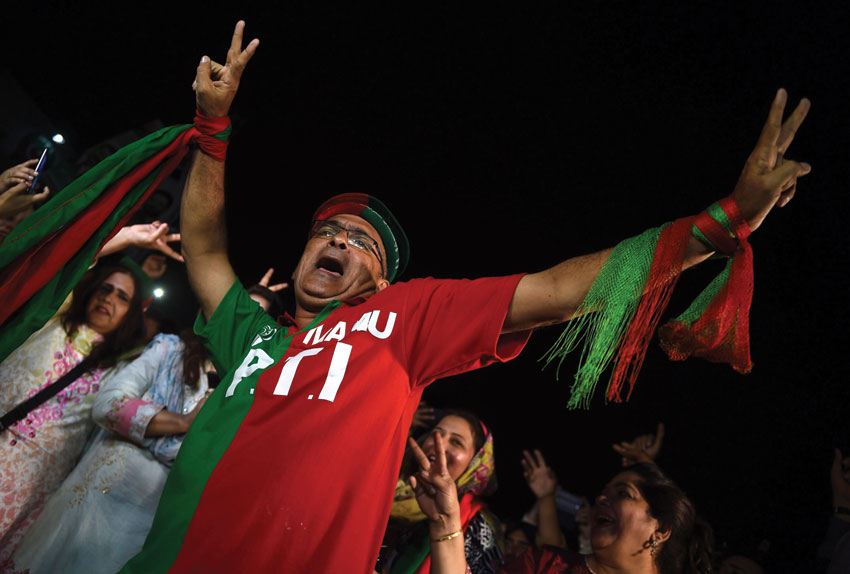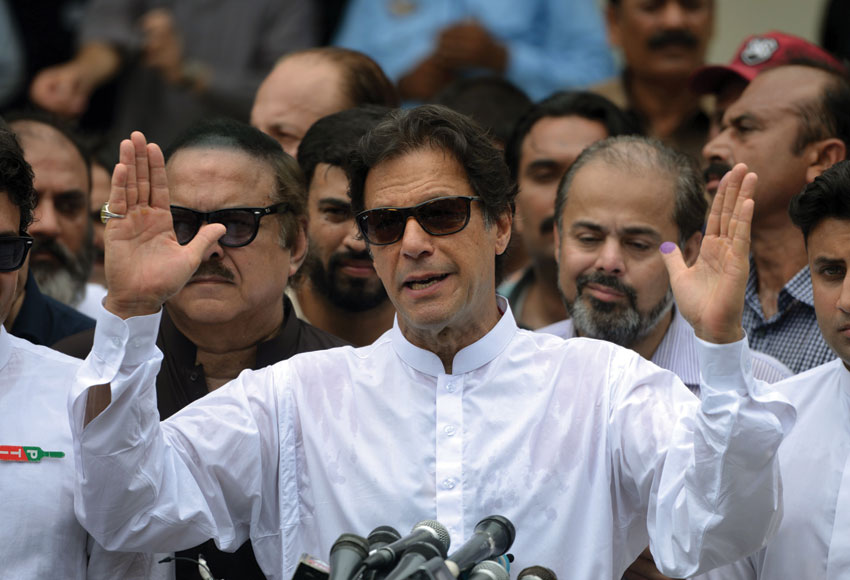Imran Khan to Wear the Pakistani Crown, All that Matters to India
Pakistan’s cricketer-turned-politician Imran Khan of the Pakistan Tehreek-e-Insaf (Movement for Justice) speaks to the media after casting his vote at a polling station during the general election in Islamabad, July 25. Pakistanis voted July 25 in elections that could propel former World Cup cricketer Imran Khan to power, as security fears intensified with a voting-day blast that killed at least 30 after a campaign marred by claims of military interference. (Aamir Qureshi/AFP/Getty Images)
Pakistan, the Western neighbor of India and home to not less than 207 million citizens and 106 million voters, just completed its 11thGeneral Elections. With a new leader, here’s all that matters to India, writes Priyanka Bhardwaj.
This Islamic country that defines itself as a “democratic parliamentary federal republic,” right since its creation on August 14, 1947, has been a witness to endless political strife, instability, secessionist movements of the Sindhis, Balochs and Pathans, religious violence and military rule, interspersed by short lived democratically elected governments besides its ongoing tension with India.
This is the second time in the country’s history when a democratic regime will hand over power to another democratically elected government.
Since May 31, when the incumbent government finished its full term, a caretaker government headed by former Chief Justice Nasir Ul Mulk was in charge.
In total 11,855 candidates were in contention for 849 seats — 577 seats of four Provincial Assemblies of Punjab, Sindh, Balochistan and Kyber Pakhtunkhwa, and 272 seats of National Assembly / Lower House of Parliament.
The system mandates a party to form the government only if it achieves majority, i.e. 172 seats, and members are to be elected through first-past-the-post system under universal adult suffrage.
The elections have been marred by violence in places such as Quetta in Balochistan, where 31 lives were killed a suicide bombing and news of fraud which have been vehemently denied by authorities.
On the slow counting of votes the Chief Election Commissioner has cited the newly installed Results Transmission System.
According to latest reports (July 26, 0900 hours) emerging from Islamabad, legendary cricketer-turned-politician, Imran Khan, of Pakistan Tehreek-i-Insaf (PTI) or Pakistan Movement for Justice, the main opposition party, is at the cusp of power, leading in 119 seats.
The 65-year-old, three times married, charismatic Khan is banking on his socially conservative, anti-corruption message and promise of a ‘Naya Pakistan’ (New Pakistan) as his party comes to power.
A cricketer who had won the first World Cup for his country in 1992 entered politics in 1996 and has styled himself as a pious, anti-poverty and anti-corruption reformer.
But his critics charge him of being a “poster-boy” of the military and Inter-Services Intelligence that are accused of engineering defections from Pakistan Muslim League-Nawaz (PML-N) to PTI.
Other controversies include his advocacy of talks with the Taliban for which he has been labeled as “Taliban Khan,” denouncement of Washington’s Afghanistan policy, attack on liberals and feminists, endorsement of radical religious parties, vow to uphold Pakistan’s blasphemy law, preference to “old electable” candidates over young, new faces, and speculations surrounding his third marriage due to leaks of the manuscript of his second wife’s book.
His oft repeated promise, to once and for all resolve the Kashmir issue, that according to him has stalled the prosperity and peace of the whole subcontinent, and assurances to the Pakistani public to raise voice against “Indian aggression” in Kashmir, at all international platforms, have done no good to his other statements that he is eager to improve Indo-Pak ties and augment trade with India, and hence Khan is not as much a preferred choice for New Delhi as much as Nawaz Sharif.
The last elections, held in May 2013, had been won by Sharif (his third term as PM) of the PML-N, winning 166 out of 342 seats, and forming the government with help of 19 independent candidates.
However, Sharif could hold on to power only till July 2017, when the Panama Papers corruption case resulted in his detention at Adiala jail, and he had to be replaced by his party’s Shahid Khaqan Abbasi.

PML-N is currently being controlled by Sharif’s brother, Shehbaz Sharif who is the reigning Chief Minister of Punjab.
Though Shehbaz enjoys better relations with the judiciary and army, he is favorably disposed towards normalizing ties with India, just as his elder brother.
From what it appears a hung verdict could be an imminent eventuality and the role of the 29-year-old Bilawal Bhutto Zardari, head of Pakistan People’s Party (PPP), scion of the leading political dynasty of the country and son of assassinated ex-PM Benazir Bhutto, who is a political debutant, could be that of a king maker.
Despite its leftist image the PPP has not much ground to win even in its traditional stronghold in the Sindh and hence can derive relevance only by joining forces with the front runner.
The scenario of PTI and PPP would be another of India’s disliking as Bhutto portrayed himself as a critic of India with his denouncement of Nawaz-Modi friendship for causing damage to the Kashmir issue and he has been quoted to have said that he would “take back Kashmir, all of it, all of it, and I will not leave behind a single inch of it because, like the other provinces, it belongs to Pakistan.”
While the Indian public is largely disinterested in Pakistan’s elections results in Pakistan, the incumbent Indian government is observing with great alertness the poll outcomes.
Ram Madhav, General Secretary of the Bharatiya Janata Party (BJP), has emphatically stated India’s hopes that the new Pakistani PM is strong and capable of putting together a stable government, free from the dictates of multiple power centers, and shorn of “cold war mentality.”
India, especially in Narendra Modi’s PM-stint, has been steadfast on its condition that it will deal only with a sovereign equal that completely ends every direct and indirect support and shelter to anti-India terrorists and activities.
In view of the 2019 General Elections in India it is unlikely that Modi would give in to any of Khan’s outreach to India, if he comes to power, without the Indian condition being met.
As impossible as it is for Modi to forget how his belief in détente, dialogue and economic engagement that he displayed in his early days at the center were brought to a naught, it would be equally difficult for the Pakistani army to let go off the power to dominate and allow for peace with the eastern neighbor.
Far too many lives have been lost imagining that peace would prevail between the two bickering neighbors, and hence India’s focus may stay on bettering its counter terrorism apparatus while keeping a full-blown war at bay.
Meanwhile, as the final results of Pakistan’s elections come in, the Indian Army is maintaining its strict vigil at the Line of Control and has warned the Pakistani establishment against any misadventure.


